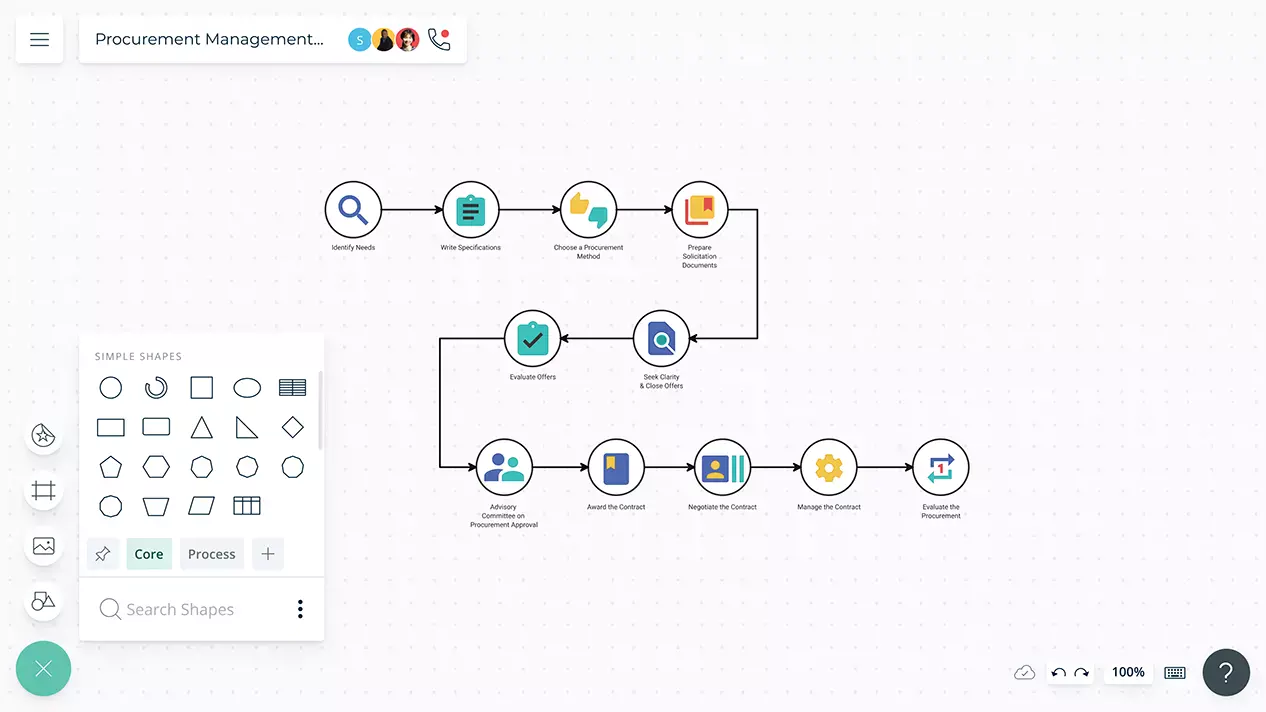Procurement Management Tools and Techniques
Streamline Organizational Expenditure for Optimal Results
Visual templates to plan and develop effective procurement strategies for your organization.
- Visualize your supplier network for better optimization
- Collaborate with your team on finding and evaluating vendors
- Segment and evaluate your suppliers together with your team

Over 10 Million people and 1000s of teams already use Creately

Streamline Your Procurement Process

Professional diagramming tools to visualize and document the various process flows & workflows involved in procurement management.
Brainstorming tools like mind maps and post-it notes walls to effectively plan and ideate around strategies for supply and supplier management.
Multiple professional templates to get a headstart on mapping and assessing your organizational procurement process.
Make Informed Decisions Faster

Single, connected canvas to collect and store documentation and assets related to the company procurement process for reference and auditing.
Add images & screenshots & attach documents with in-app previews for purchase requests, approved invoices, etc. to keep them in a centralized location.
Migrate key vendor information onto the canvas to visualize them as meaningful data shapes for easy vendor performance analysis.
Built-in tools to create interactive and dynamic reports, dashboards, and presentations on purchasing data and trends to inform stakeholders.


Collaboratively Evaluate & Identify Procurement Sources

Built-in video conferencing to work with your procurement management team on the canvas to evaluate vendors and suppliers.
Real-time cursors for any number of participants to sort the procurement sources on a shared canvas.
Integrate into popular platforms like Slack, Google, Github, Confluence, and more to streamline cross-functional workflows.
Use @mention comments to tag teammates or suppliers to get things done or clarify things and comment threads to have discussions and follow-ups on the same canvas.
What Is Procurement Management?
Procurement management is a strategic process of managing organizational expenditure and suppliers. It helps organizations benefit from a streamlined purchasing process for optimal results. It is used to ensure that a company pays the best price for products and services, and saves time and unnecessary costs by selecting and developing relationships with the vendors that make the best strategic fit for the company.
How to Create a Procurement Management Plan?
- Before developing a procurement strategy, you need to assess your company’s current performance and its targets and needs.
- Collect all data needed for the evaluation. These might include process maps, resources used, costs for the departments and current growth projections.
- Using an org chart, list everyone who should be involved in the procurement process and decision-making. Add their contact information to the chart as well.
- Identify the materials required by the company/ projects. This could include a range of things from equipment to software licenses.
- Mark down all information related to the item, like size, quantity, technical specs etc. in order to ensure that you are purchasing the correct tool for the project.
- Set a purchasing timeline and include a “need-by” date for each item. Your purchasing plan should also include efficient purchasing steps to reduce costs and a budget.
- Sort out all your suppliers that worked with you over a period. Using a segmentation chart, you can categorize your suppliers selecting ones that best fit company requirements depending on their performance and service quality.
- The procurement management team can then list all the suppliers and evaluate their dependability, cost, quantity, customer service, and efficiency using a mind map.
- Once the proposals, quotes, or bids from the potential suppliers are received, get the strategic procurement team to evaluate them and select the successful supplier.
